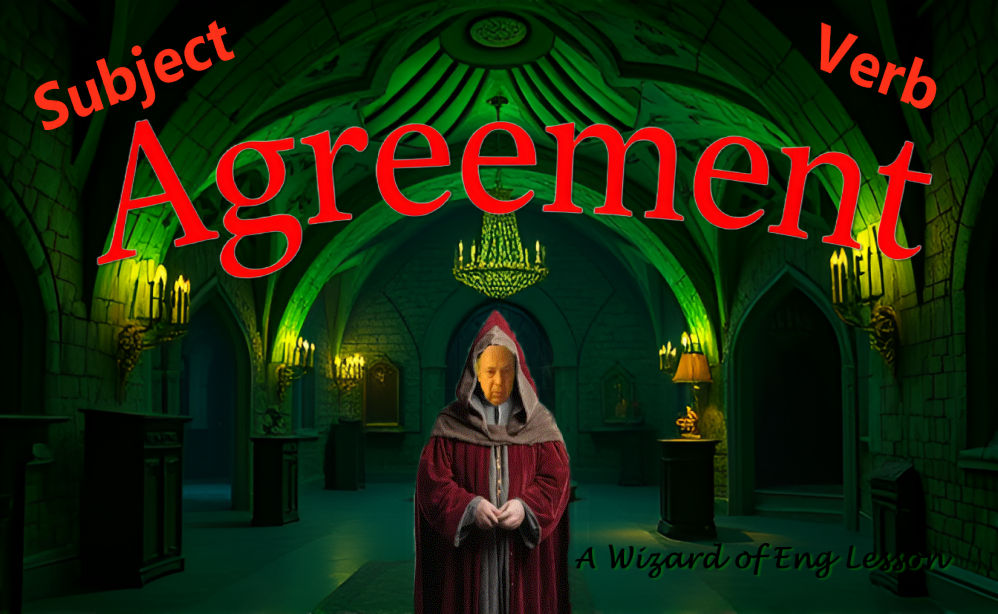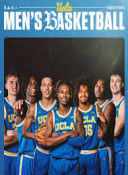


In English the subject and verb must agree in number.
So, of the first photo above we can say, "Len plays guitar."
However, with the second photo we might say, "They play guitar."
Subject-verb agreement is not always as easy as it seems in the example above.
The rules can be a bit tricky. Let's take a look at these rules.
Consider the following sentences. Do they have different meanings?
Is the grammar different?
1. The number of students is large.
2. A number of students are large.
In sentence number 1, the subject is The number,
that is, the population or amount of students.
In contrast, the subject in sentence number 2 is students.
It suggests that several students are large.
Here's the rule:
1. The number
of students is large.
2. A number
of students are large.
With the number of _______, use a singular verb.
With a number of _______, use a plural verb.


A bowl of olives sits on the table.

Why use the singular verb sits?
There are, after all, several olives in the bowl, right?
What is the subject of the sentence?
Addressing the questions posed above, one should note
that a phrase or clause between subject and verb
does not change the number of the subject.
The subject of the sentence here is A bowl.
It doesn't matter how many words separate it from
the verb; the verb must be singular because
A bowl is singular.
One could say, "A bowl of delicious, green olives imported
from Italy sits on the table."
Both the subject A bowl and the verb sits would
still be singular.
Indefinite Pronouns As Subjects
2. Everyone is doing what they can.
3. Someone has to know the answer.
█ What do you think is the rule for each of the indefinite
pronouns in the sentences above?

It should be clear that singular indefinite pronoun subjects
take singular verbs.
Let's have a look at the list of these indefinite pronouns.
List of Singular Indefinite Pronouns As Subjects
no one, nobody, nothing
anyone, anybody, anything
someone, somebody, something
everyone, everybody, everything
Yes, it's a long list, but if you look closely, you will see a pattern to it.
█ What if the indefinite pronoun is plural?
 For example:
Both do a lot of work in the office.
For example:
Both do a lot of work in the office.
The rule: Plural indefinite pronoun subjects take plural verbs.
List of Plural Indefinite Pronouns As Subjects
few
both
many
█ Some indefinite pronouns may be either singular or plural:
with uncountable, use singular; with countable, use plural.

Examples:
A) Some of the sugar is on the floor.
B) Some of the marbles are on the floor.
The noun marbles is countable;therefore,
the sentence has a plural verb.
any
none
all
most
Compound Subjects
 A cup of coffee and a donut wake me up.
A cup of coffee and a donut wake me up.
Here's another example:
A pencil and an eraser make writing easier.
The rule: Compound subjects joined by and are always plural.
Consider the following two sentences. What's going on?
1. Neither the director nor the
actors are following the script.
2. Neither the actors nor the
director is following the script.
Why does the first sentence have a plural verb?
Why does the second sentence use a singular verb?
Here is the explanation.
In the first example the plural verb are
agrees with the nearer subject actors.
In the second example the singular verb is
agrees with the nearer subject director.
Inverted Subjects
 Waiter, there is a fly in my soup.
Waiter, there is a fly in my soup.
How are the defendants in the trial
taking the bad news?
Inversion happens when we reverse (invert) the normal word
order of a structure, most commonly the subject-verb word order.
Collective Nouns
 Collective nouns (group, jury, crowd, team, etc.) may
Collective nouns (group, jury, crowd, team, etc.) may
be singular or plural, depending on meaning.
The jury has awarded custody to the mother.
In this example, the jury is acting as one unit; therefore, the verb is singular.
The jury members have been arguing for five days.
In this example, the jury members are acting as twelve individuals; therefore, the verb is plural.
- the blind
- the dead
- the deaf
- the handicapped
- the living
- the young
Plural Form Subjects
 The news is bad.
The news is bad.
Measles is a childhood disease.
Plural form subjects with a singular meaning take a singular verb.
(e.g. news, measles, mumps, mathematics, physics, etc.)
 His behavior last night was terrible.
His behavior last night was terrible.
Animal behaviors are best studied in the wild.
The second sentence is in reference to various types of behaviors
or a collection of behaviors.
 Politics is a controversial subject.
Politics is a controversial subject.
In this example, politics is a single topic; therefore, the sentence has a singular verb.
The politics of the situation were complicated.
In this example, politics refers to the many aspects of the situation;
therefore, the sentence has a plural verb.
 The scissors are on the table.
The scissors are on the table.
The pair of scissors is on the table.
Note: In this example, the subject of the sentence is pair; therefore, the verb must agree with it.
(Because scissors is the object of the preposition, scissors does not affect the number of the verb.)
take a plural verb. (e.g. scissors, trousers)
Subject and Subjective Complement of Different Number
 My favorite poem is "Bavarian Gentians"
by D.H. Lawrence.
My favorite poem is "Bavarian Gentians"
by D.H. Lawrence.
With subject and subjective complement of different number, the verb always agrees with the subject.
One of...
The above example implies that others besides Elizabeta like to read poetry. Therefore, the plural verb is the correct form to use.
Elizabeta is the only one of those people who likes to read poetry.
The above example implies that no one else except for Elizabeta likes to read poetry. Therefore, the singular verb is the correct form to use.
With one of those ________ who, use a plural verb.
With the only one of those ________who, use a singular verb.
 CHECK UP
CHECK UP Choose the correct option to complete the sentences.
Listen & Respond
Check your response against the rules that you learned.
Rule
Audio #2
Rule
Audio #3
Rule
Audio #4
Rule
Audio #5
Rule
Audio #6
Rule
Audio #7
Rule
Audio #8
Rule
Active Skill Check
For each of the following images create a sentence
demonstrating your
knowledge of the grammar rules
learned in this lesson.















